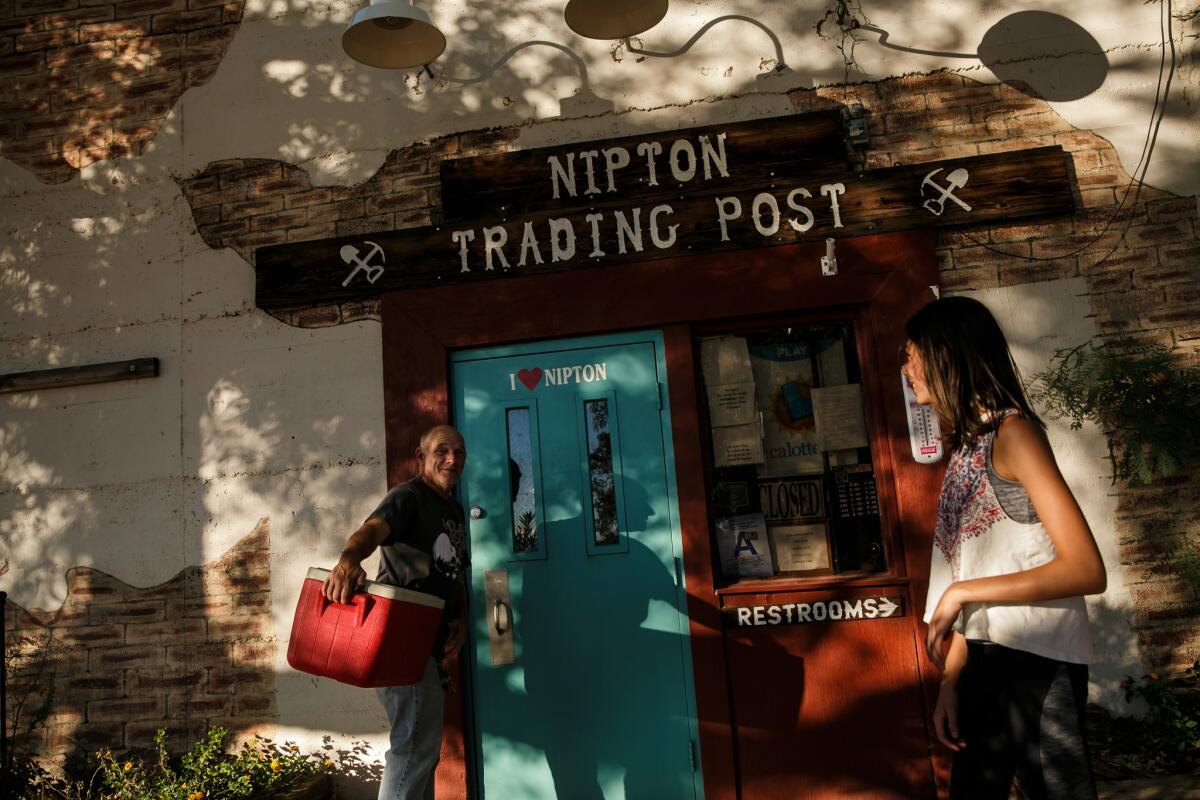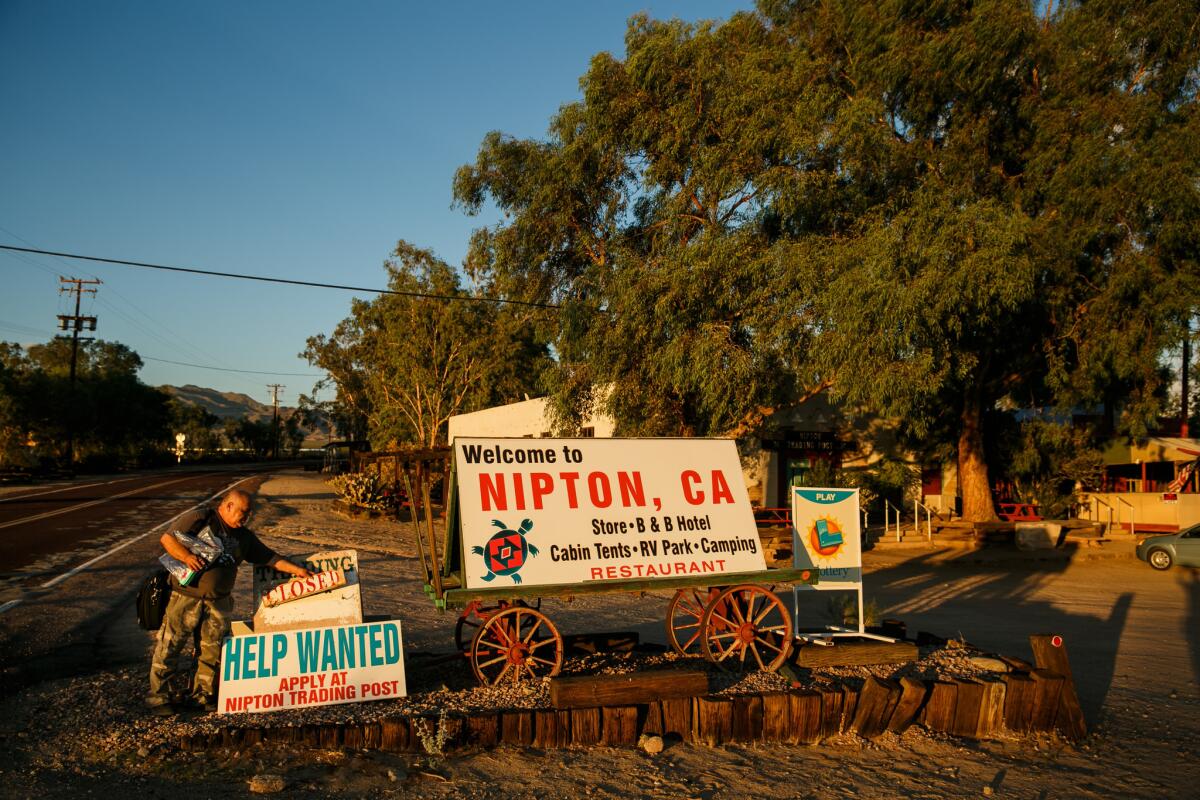Can marijuana finally turn this remote Mojave outpost into a boom town?

- Share via
Gerald Freeman struggled for three decades to transform this desolate Mojave Desert outpost into a 21st century mecca for nature lovers and prospectors, spending more than $1 million on restoration, shade trees, organic farming projects and gleaming solar panels.
He wasn’t the first.
Nipton had cycled through seven private owners before the Caltech-trained geologist bought the town for $200,000 — all of them believing that a renaissance was at hand for the torrid community composed of a store, a five-room hotel and a handful of homes about 10 miles from Interstate 15 and two miles west of the Nevada state line.
Now, with the legalization of recreational
“We want to pick up where Gerry left off,” said Stephen Shearin, a spokesman for American Green, which has high hopes of turning Nipton into a desert wonderland for potheads and a distribution center for marijuana-related products.
The efforts to rebrand this tiny, tattered town as a Pot City USA reflect the “green rush” — elusive or not — that has swept some parts of California since voters in November legalized marijuana use.
A recent economic study sponsored by the state estimated that the legal market for marijuana could be more than $5 billion, and that it could help make California a destination for pot-loving tourists.
Some cities already are trying to cash in by aggressively approving marijuana licenses in hopes of generating needed tax income; bed and breakfasts in Washington and Colorado have been advertising marijuana vacation getaways for years.
But the situation in Nipton is in a league of its own.
“We are excited to lead the charge,” David Gwyther, chairman and president of American Green, said in a statement. “The cannabis revolution that’s going on in the U.S. has the power to completely revitalize communities in the same way gold did during the 19th century.
“This acquisition allows us to channel the myriad interests in cannabis production and consumption,” he said, “for an immediate positive impact to this community’s members and to cannabis consumers across the country.”
The company’s promotional materials tout plans for hundreds of hotel rooms, mineral baths, a restaurant, a dinner theater, a cannabis farm, a huge balloon to hoist visitors into the air and a “Green Express” — a passenger rail line between Los Angeles and Las Vegas, with a dinner stop in Nipton.
It also intends to sell bottled water from local wells that has been mixed with certain marijuana extracts. “That water won’t make you high, but will make you feel like you’re 18 again,” Shearin said.
State and county officials are taking a wait-and-see approach.
Though a growing number of financially strapped communities across the state are seeking licenses to open pot dispensaries, San Bernardino County laws prohibit commercial cannabis activities in its unincorporated areas — with an exemption allowing people to cultivate marijuana plants indoors for their personal use.
“Unless Nipton incorporates, land-use permits will not be issued and full criminal enforcement procedures will be in effect,” San Bernardino County Sheriff’s Lt. Sarkis Ohannessian said. “As long as they follow the law, we’re all good.”
With that in mind, American Green said it plans to incorporate Nipton and then implement its own laws.
That won’t be easy. Incorporation of a community in California is a costly and complex process that can take years, said Kathleen Rollings-McDonald, spokeswoman for the Local Agency Formation Commission in San Bernardino County.
“State law requires a minimum of 500 registered voters and a minimum population of 10,000 residents in order to have a tax base to offset the costs of basic municipal needs such as law enforcement,” she said. “So due diligence appears to be a little short in this case.”
Some would call that an understatement. Nipton — whose first residents were miners in search of gold in the late 1800s — has a population of six.
American Green ended the first quarter of this year with just $191,000 in cash and debts of more than $6 million, according to its financial statements. On Friday, its stock was $.0022 per share.
The 120-acre town was purchased with “preferred shares, venture loans and by working with capital investors,” Shearin said.
Until news of Nipton’s purchase by a cannabis company raised eyebrows around the world, the town — just a 15-minute drive from the casinos in Searchlight, Nev. — was best known as one of California’s biggest lottery ticket sellers.

Freeman’s wife decided it was time to let her husband’s dream go after he died of heart failure a year ago at age 81.
“Nipton was always Gerry’s thing, not mine,” said Roxanne Freeman, 67. “Without him around, I really can’t wait to get out of Dodge.”
With escrow expected to close in November, she said, “I’m at a crossroads. I’ve been thinking about moving to Kansas City — or to a coastal city like Laguna Beach, with cooling sea breezes and views of the Pacific Ocean.”
Sign up for Essential California
The most important California stories and recommendations in your inbox every morning.
You may occasionally receive promotional content from the Los Angeles Times.








